Nareit’s REITwise 2024: Law, Accounting & Finance Conference convened almost 1,100 real estate executives and REIT industry professionals this week. The three-day educational program focused on current issues of importance for REITs and publicly traded real estate companies in all areas of legal, financial, tax, and accounting operations. The event attracted attendees from 538 companies, including 143 member REITs, and featured almost 100 panelists and keynote speakers.
Read on for a recap of general and concurrent session presentations.
Intro to REIT Taxation

Moderator Donna Wagner, executive vice president, tax, at JBG SMITH, and her four-person panel—with combined tax-related experience of more than 100 years—discussed some of the basic tax rules governing REITs, while highlighting several notable traps for the unwary. Bob Schachat, managing director at BDO USA LLP, began the discussion by defining a REIT, describing the taxation of REITs and their shareholders, and noting the benefits and burdens of REIT status, as well as some dealer sales issues. Shiukay Hung, partner and co-chair, national REIT practice at DLA Piper, then introduced a hypothetical “super REIT” to illustrate the REIT gross income tests and some of the issues regarding short-term leases to the nearly 400-person audience. Hung and Wagner, joined by KPMG Partner Matthew Ams, then stressed the importance of identifying hedges on the same day they are entered into, while also providing attendees with a sample global hedge policy.
Julanne Allen, principal at PwC, and Wagner emphasized the importance of monitoring the provision of services at REIT-owned properties to avoid excessive impermissible tenant services income (ITSI). Allen then turned to the “beautifully written” 1.856-10 regulations defining REIT-related real property and the safe harbor in their preamble requiring REITs that install solar panels on their properties to be net buyers of energy from the grid. Ams used another super REIT example to demonstrate how attribution rules can lead to disqualified related-party rent.
Government Relations Update

Nareit’s Cathy Barre, EVP and general counsel, led a panel that addressed the association’s legislative and regulatory policy priorities, and also included fellow Nareit staff: Tony Edwards, senior EVP; Dara Bernstein, SVP and tax counsel; Chris Drula, SVP, financial standards; and Penny Rostow, SVP, regulatory affairs and deputy general counsel. Other panelists included: Kimberly Arndt, tax counsel for the Senate Finance Committee, Majority Staff; Ray Beeman, principal at EY; Matthew Berger, VP, tax and student housing, at NMHC; Andrea Hoffenson, senior technician reviewer, Branch 3, at the Internal Revenue Service; Ameek Ponda, partner at Sullivan & Worcester LLP; and Kendal Sibley, partner at Hunton Andrews Kurth LLP. The panel provided a Washington policy outlook, talked about how the new FINCEN rules apply to public REITs, and included a conversation with IRS representatives.
Insurance Committee
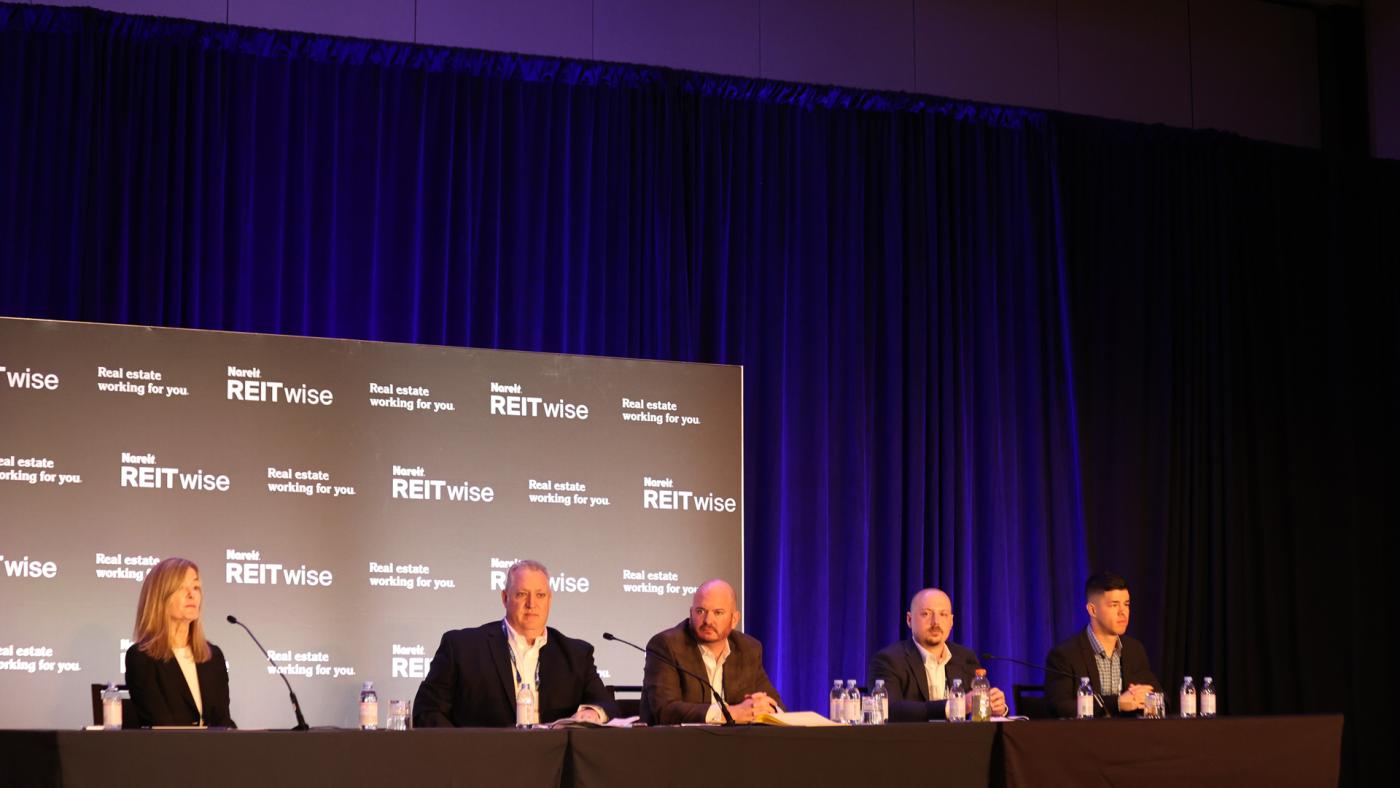
Moderator Janet Kerr, vice president, risk management at BXP and Nareit Insurance Committee chair, led a discussion on D&O insurance, property market insurance, and cyber insurance. Panelists from Alliant/Arch provided a REIT securities class action update, discussed environmental disclosure rules, and provided a general REIT D&O market update. Panelist Ryan Barber, managing director/national advisory leader at Marsh, provided a property market update and outlook for 2024. Panelist Kevin Smith, senior vice president, management, cyber and professional liability at NFP, discussed cyber claim trends, provided a cyber insurance market update, and discussed the REIT cyber insurance risk mitigation survey.
State & Local Tax (SALT) Issues for REITs
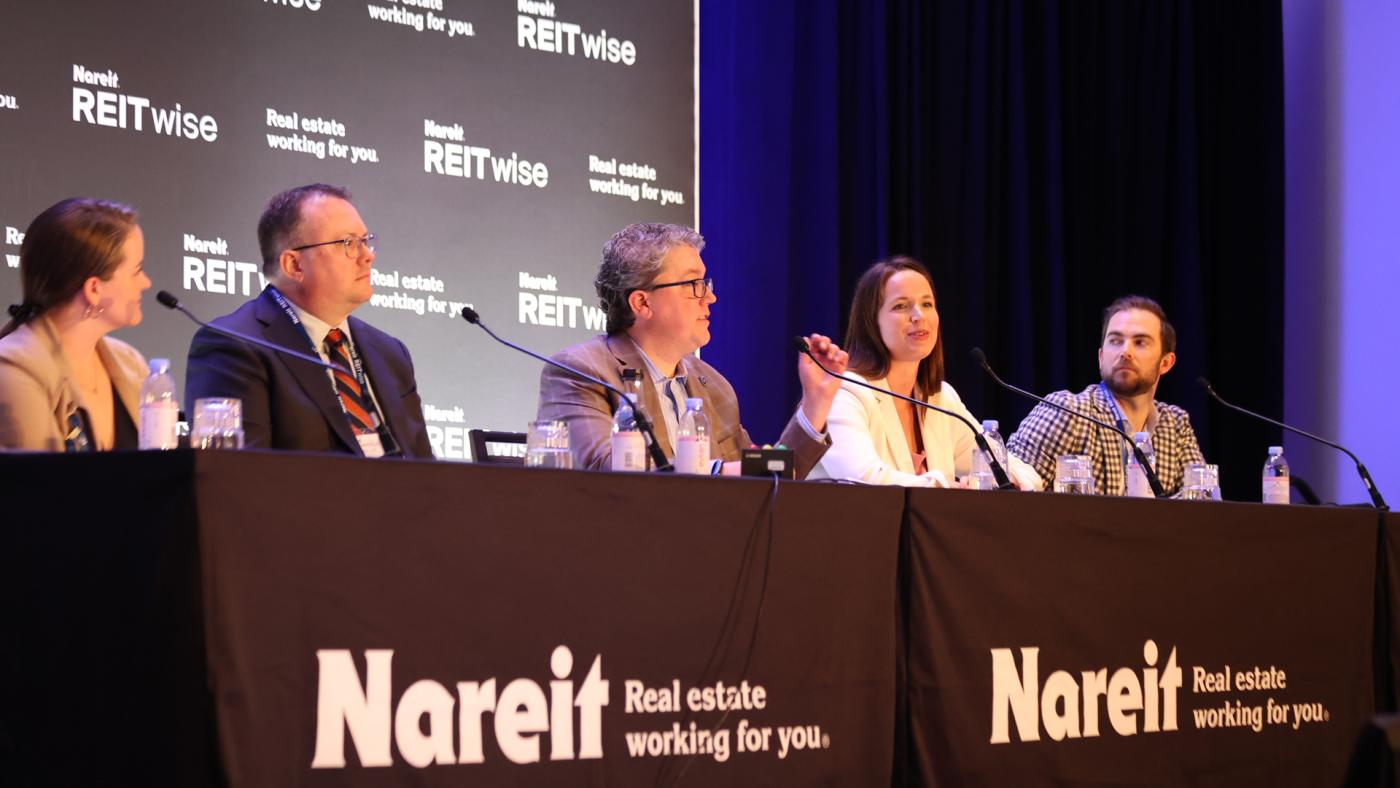
The session was moderated by Jessica Newman, senior director at The RMR Group. Amy McLocklin, senior manager at EY, kicked off the discussion by listing the top five common misconceptions regarding SALT issues and REITs, including that if a multi-state REIT’s properties in a specific state are operating in losses, there won’t be tax liability in that state.
Among other topics, Brad Wilhelmson, managing director at KPMG, and Michael Wanroy, senior manager at RSM, provided a general overview of the calculation of state income taxes by REITs. Wanroy also highlighted pending Tennessee franchise tax legislation that could lead to retroactive refund claims. Chance Woodard, director at PwC, compared various SALT implications when investing specifically in New Hampshire, Oregon, Tennessee, or Texas.
Opening General Session: State of the Capital and Real Estate Markets

In this session, panelists focused on the macroeconomic environment and how REITs and commercial real estate are navigating the ongoing high interest rate environment and uncertainty surrounding when the Federal Reserve will cut rates. Key topics of discussion included capital availability, the debt markets, and the types and structure of debt that REITs are issuing. In addition, panelists talked about public and private real estate market valuations, the current divergence between those valuations, and when they might converge. Steven Loffman, managing director at Raymond James, moderated the panel, which also featured: Darrell Crate, CEO at Easterly Government Properties; Raj Rehan, head of real estate securities, Americas at BlackRock Financial Realty; Bayle Smith, senior vice president, advisory services at Green Street; Mark Streeter, managing director at J.P. Morgan Chase & Co.; and John Worth, executive vice president, research and investor outreach at Nareit.
General Session: Mergers & Acquisitions

The recent trends and developments that legal and REIT experts are seeing in mergers and acquisitions (M&A) activity took center stage during this session. Panelists discussed notable REIT transactions in 2023 and details about the final deals. Going into the 2024 proxy season, panelists also discussed the rise in REIT activism and the role the universal proxy card is playing in activism. In addition, they talked about the current factors that boards need to consider when handling mergers and acquisitions or shareholder activism activity. Robin Panovka, partner at Wachtell, Lipton, Rosen & Katz, moderated the session, which also featured: Michelle Bushore, executive vice president, chief legal officer, and general counsel at Realty Income Corporation; Gilbert G. Menna, of counsel at Goodwin; Brandon Moore, chief operating officer, secretary, and general counsel at Gaming & Leisure Properties, Inc.; and Sapna Sanagavarapu, chief legal officer at W.P. Carey Inc.
Latest Developments at FASB and SEC Affecting Commercial Real Estate
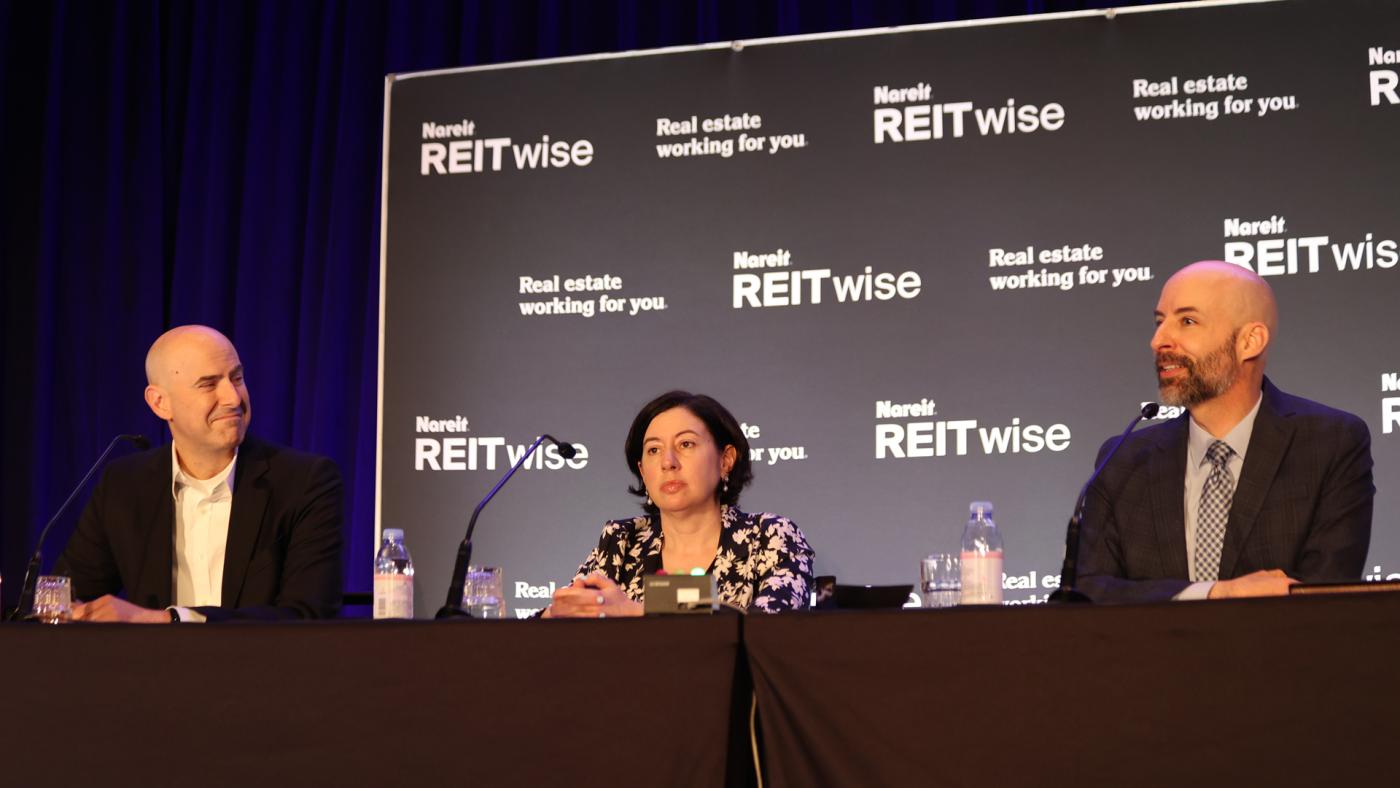
Nareit’s Chris Drula, SVP, financial standards, spoke with SEC Deputy Chief Accountant Jonathan Wiggins and FASB Assistant Director Mary Mazzella about their respective standard setting priorities. Wiggins discussed the key components of the SEC’s recently issued Climate-Related Disclosures Rule and the SEC’s focus on the Statement of Cash Flows. Mazzella provided attendees with a status update on projects relevant to the real estate industry, including segment reporting, improvements to income tax disclosures, and disaggregation of income statement expenses.
REIT Tax Emerging Issues

Moderator Mike Anthony, Blackstone Real Estate Advisors, led panelists Paige Anderson, partner at Vinson & Elkins LLP; Cristina Arumi, partner at Hogan Lovells; James Elton, director, tax at Deloitte LLP; and Tom Morrisroe, tax partner at Deloitte Tax LLP, in a discussion of various emerging tax issues for REITs. Anderson provided an overview of issues relating to EV charging stations and the current proposed regulations on transferable energy tax credits and REITs. Elton reviewed the current OECD Pillar Two rules along with Anthony, both of whom welcomed expected clarifying guidance from the OECD. Arumi explained technical tax rules applicable to convertible and redeemable preferred securities in REIT M&A, and Morrisroe discussed non-core asset sales using a taxable REIT subsidiary. Sarah Ralph, principal at EY, contributed to the panel’s sourcebook materials.
General Counsel Issues

In this session, panelists discussed a wide range of key issues that general counsels are focusing on, including everything from managing cybersecurity risk to the role of general counsels in implementing diversity, equity, and inclusion policies. In addition, panelists also discussed handling shareholder activism activity. Gail Makode, chief legal officer and general counsel at Omega Healthcare Investors, moderated the session, which also featured: David Finch, vice president, secretary, and general counsel at COPT Defense Properties; Christine Garrison, general counsel and secretary at Farmland Partners Inc.; David Klein, executive vice president and general counsel at Sunstone Hotel Investors, Inc.; and Anne Morrison, executive vice president and general counsel at Essex Property Trust, Inc.
Lunch General Session: Technology Rising—Creating an AI Ready Culture for REITs

Dr. Alondra Nelson, a science and technology policy expert and former White House director for science and society, participated in a fireside chat with Nareit’s Ayris T. Scales, SVP of social responsibility and global initiatives, during the general session at Wednesday’s lunch. They discussed how AI aligns with the fundamentals of decision-making in real estate; how to ensure an ethical integration of AI within the REIT sector; and how REITs can create an AI-ready culture that prioritizes cybersecurity and safeguards sensitive information, as well as how to mitigate risks associated with data breaches. Nelson and Scales also dissected the potential policy implications of AI adoption within the REIT sector; how AI can impact issues of diversity and inclusion within the REIT industry, as well as how to proactively address potential biases in AI algorithms; and how REITs, especially data centers and cell towers, can integrate AI technologies while maintaining the industry's core values.
SEC/PCAOB Hot Topics
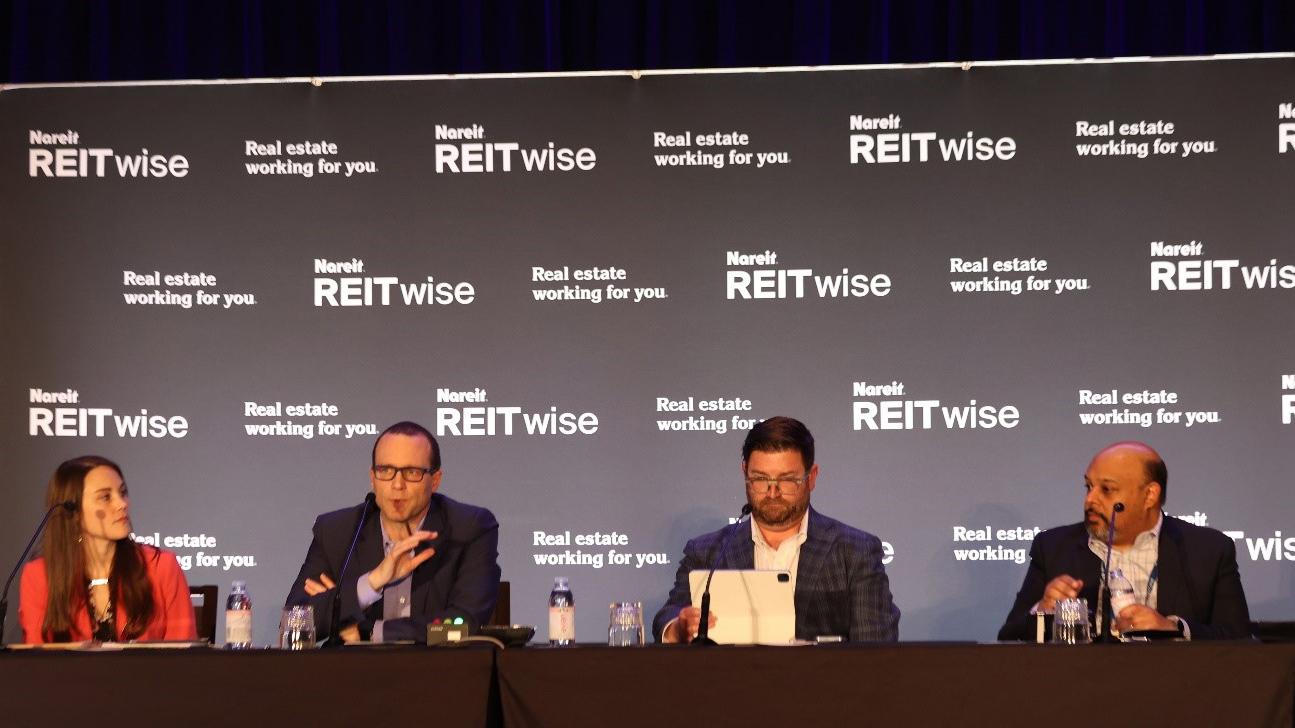
Katelyn Peek, VP, SEC reporting at Prologis, Inc., led a discussion on the latest developments at the SEC’s Division of Corporation Finance and the Public Company Accounting Oversight Board (PCAOB). Mark Kronforst, partner at EY, discussed SEC comment letters trends and the Commission’s ongoing focus on non-GAAP measures. Dennis McGowan, VP, professional practice and anti-fraud initiatives, at CAQ, discussed the latest standard setting initiatives at the PCAOB, including its Non-Compliance with Laws and Regulations Proposal. Nish Metha, partner at Grant Thornton, provided an overview of critical audit matters for real estate companies for 2023 audit reports, and the outlook for 2024.
Operational Tax/Day-to-Day Issues
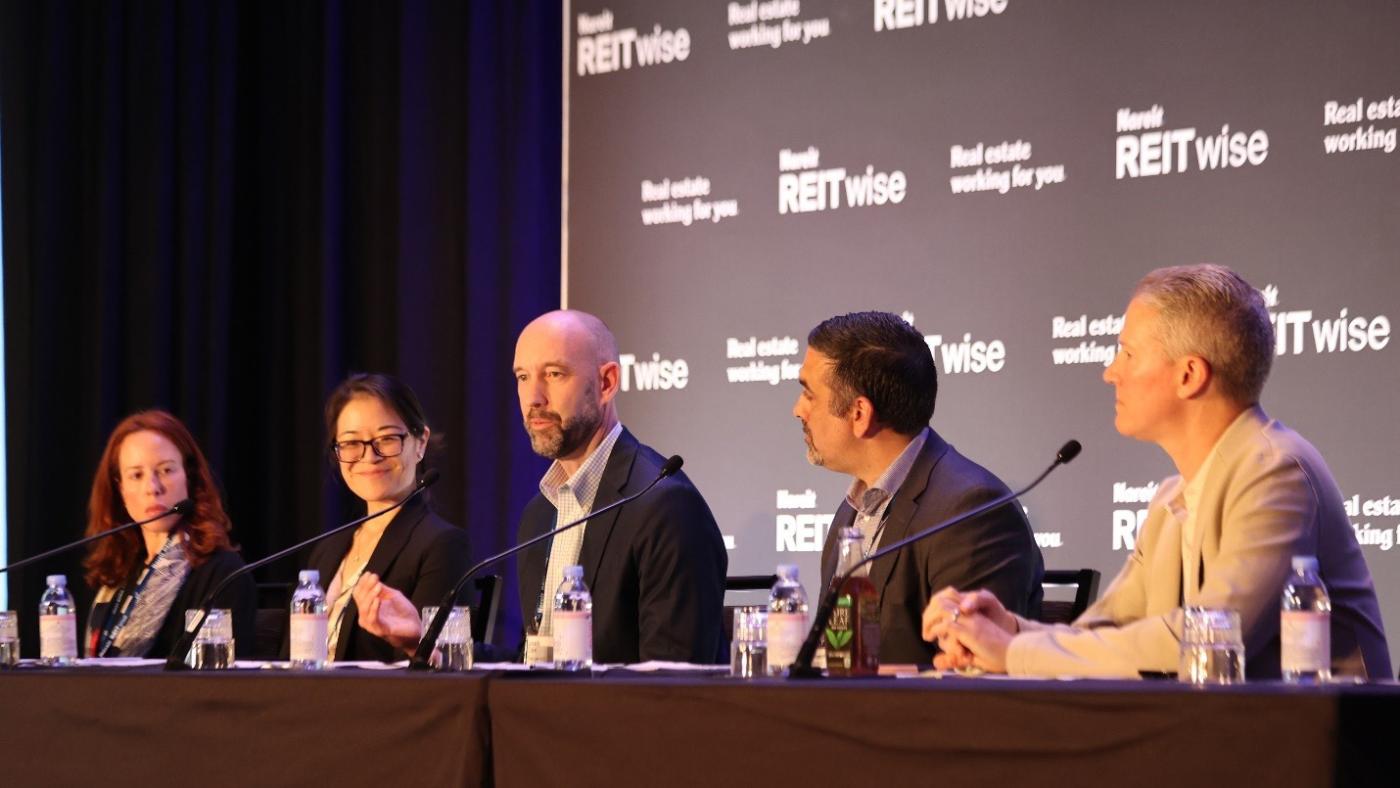
Ana O’Brien, partner at Latham & Watkins LLP, led a lively discussion concerning operational and day-to-day tax issues affecting REITs, with panelists: Joe Bertucci, senior vice president, global head of tax, at Digital Realty Trust; Josh Cox, senior vice president, tax, at Tanger Inc.; Scott McLaughlin, senior vice president, investor relations and tax, at Invitation Homes; and Gina Tan, senior vice president, taxes, at Kilroy Realty Corporation.
McLaughlin shared his perspective on so-called “January dividends” under Section 857(b)(9) (dividends declared in the last three months of the year and distributed in January of the following year), noting that Invitation Homes had shifted its dividend record dates in order to allow for January dividends to be distributed during the ordinary dividend distribution date.
The panel also discussed Kimco Realty’s recent decision to retain and pay tax on capital gains and the use of cash/stock dividends, both with and without a potential reverse stock split, something strongly encouraged by McLaughlin. Tan at Kilroy noted the importance of seeing other examples, including with respect to investor perception.
Meanwhile, Bertucci at Digital Realty suggested that REITs with or considering joint ventures outside of the U.S. should look at the impact of the Pillar Two global minimum tax in advance. Cox discussed Tanger’s interest in expanding its use of solar, consistent with its sustainability goals, among other reasons.
Corporate Governance

This session focused on a variety of corporate governance issues. Chief among them was the SEC’s final public company climate disclosure rule and what the reporting and implementation requirements will mean for REITs. Panelists also discussed the dynamics surrounding opening up proxy voting to retail investors and key takeaways from the 2023 proxy season. They rounded out the discussion by talking about what REITs need to consider when refreshing their boards, particularly the key factors that the board needs to discuss when conducting succession planning and the importance of using skills matrices to identify current and future gaps in board expertise. Samantha Gallagher, executive vice president and general counsel at VICI Properties Inc., moderated the session, which also featured: Hirsh Ament, partner at Venable; Scott Fenster, executive vice president and general counsel at Equity Residential; Edward Nekritz, chief legal officer and general counsel at Prologis, Inc.; and David Slotkin, partner at Morrison & Foerster LLP.
General Session: Implications of the SCOTUS Harvard/UNC Decisions on Corporate Policies & DEI Programs
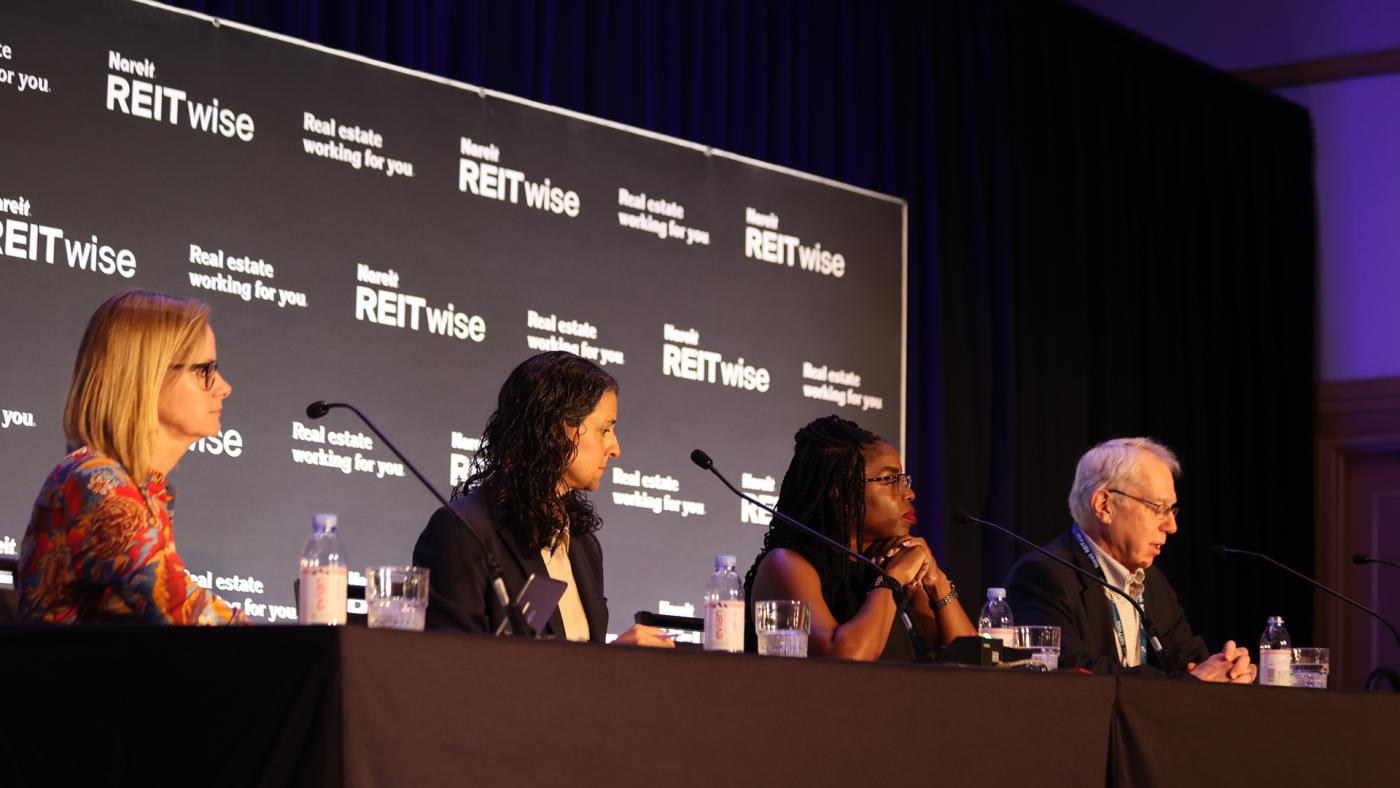
During this session, panelists set the stage by giving an overview of the U.S. Supreme Court’s decisions that effectively prohibited the use of affirmative action policies. The conversation then focused on how the decisions could affect corporations, including what companies now need to consider when hiring, setting up or maintaining employee resource groups, and implementing internal and external programs targeting underrepresented employees. The panelists also offered insights on how the decisions could affect corporate foundations and social justice grants. Ruth Dowling, executive vice president, chief accounting officer, general counsel, and secretary at American Tower Corporation, moderated the session, which also featured: Robert Hale, partner and chair, employment, at Goodwin; Michele Machalani, associate general counsel at Deloitte LLP; and Nikki Lewis Simon, senior vice president, shareholder, and chief DEI officer at Greenberg Traurig, LLP.
Treasurer’s Vault
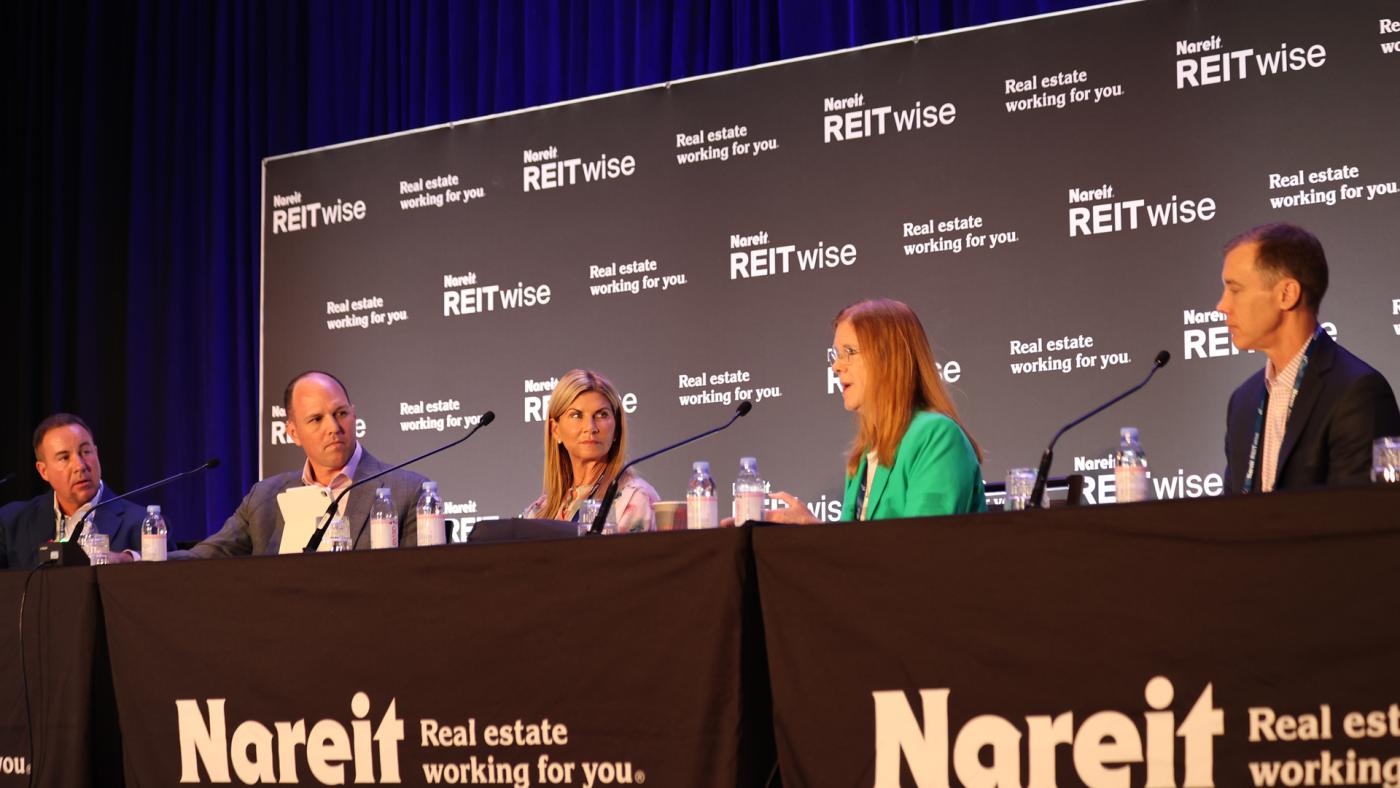
John Gottfried, CFO at Acadia Realty Trust, moderated key areas of focus for treasurers at this session. Catherine Cantasano, executive director and treasurer at W.P. Carey Inc., discussed how her company is leveraging technology to improve the effectiveness and efficiency of tasks in the treasury department. Francine Glandt, managing director, real estate corporate and investment banking, at Truist Securities, summarized the key aspects of Basel III and how it is impacting bank lending. Michael Mas, EVP and CFO at Regency Centers, discussed the importance of maintaining bank relationships and provided an overview of why banks play a crucial role in capital stacks through revolvers and term loans. Paul Elsen, director, hedging and capital markets, at Chatham Financial, highlighted the use of derivatives and hedging to mitigate interest rate risks in today’s market conditions.
Taxing Partnerships: JVs; Debt Workouts and REIT Compliance
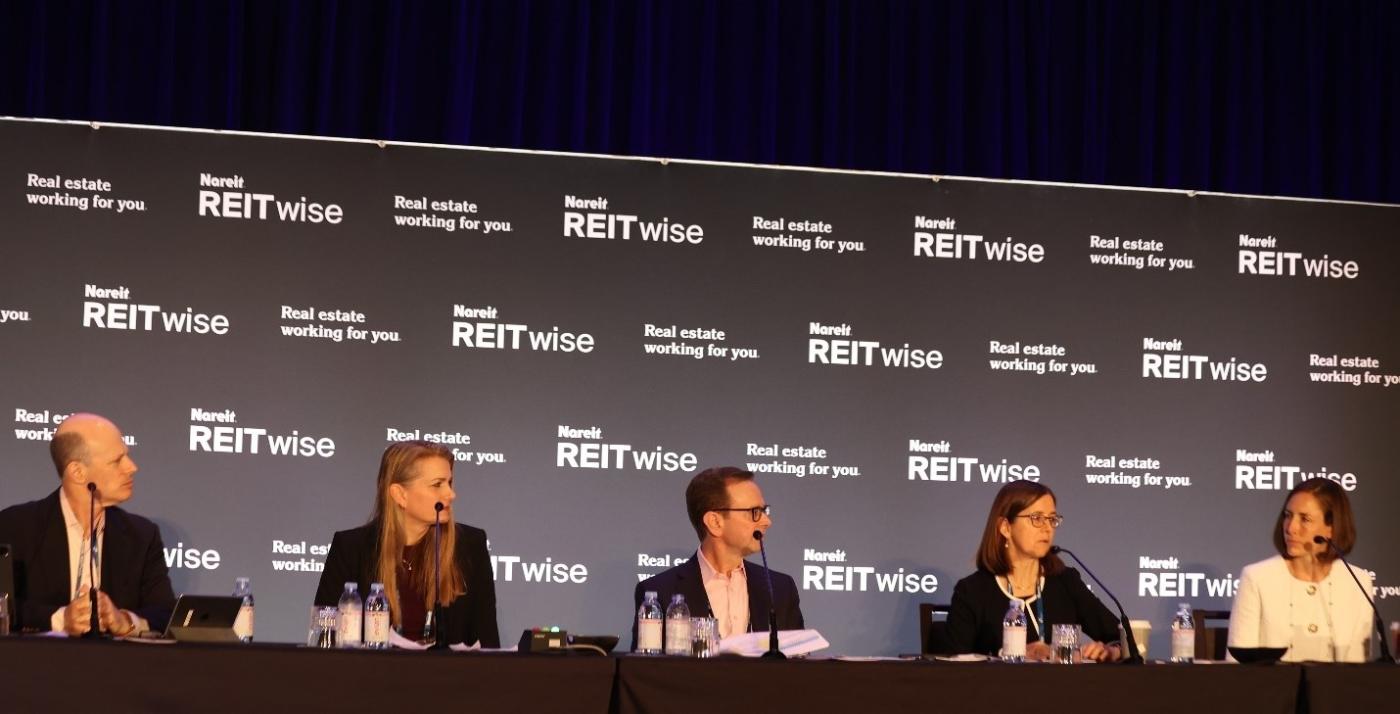
Led by moderator Adam Cohen, senior vice president, tax, at Safehold, Inc., the Taxing Partnerships: JVs, Debt Workouts and REIT Compliance panel addressed a number of partnership tax-related issues. Jennifer Ray, principal at Deloitte LLP, provided an overview of partnership preferred equity; Cam Cosby, partner at Fried Frank, reviewed the “note and bolts” of LTIP structuring; Julie Robins, tax principal at BDO USA, detailed the basic rules governing transferring property to and from partnerships, along with some debt workout rules; and Kate Kraus, partner at Allen Matkins Leck Gamble Mallory & Natsis LLP, alerted the attendees to the implications of the BBA Bipartisan Budget Act (BBA) of 2015 centralized partnership audit regime to REITs.
SEC Legal Updates
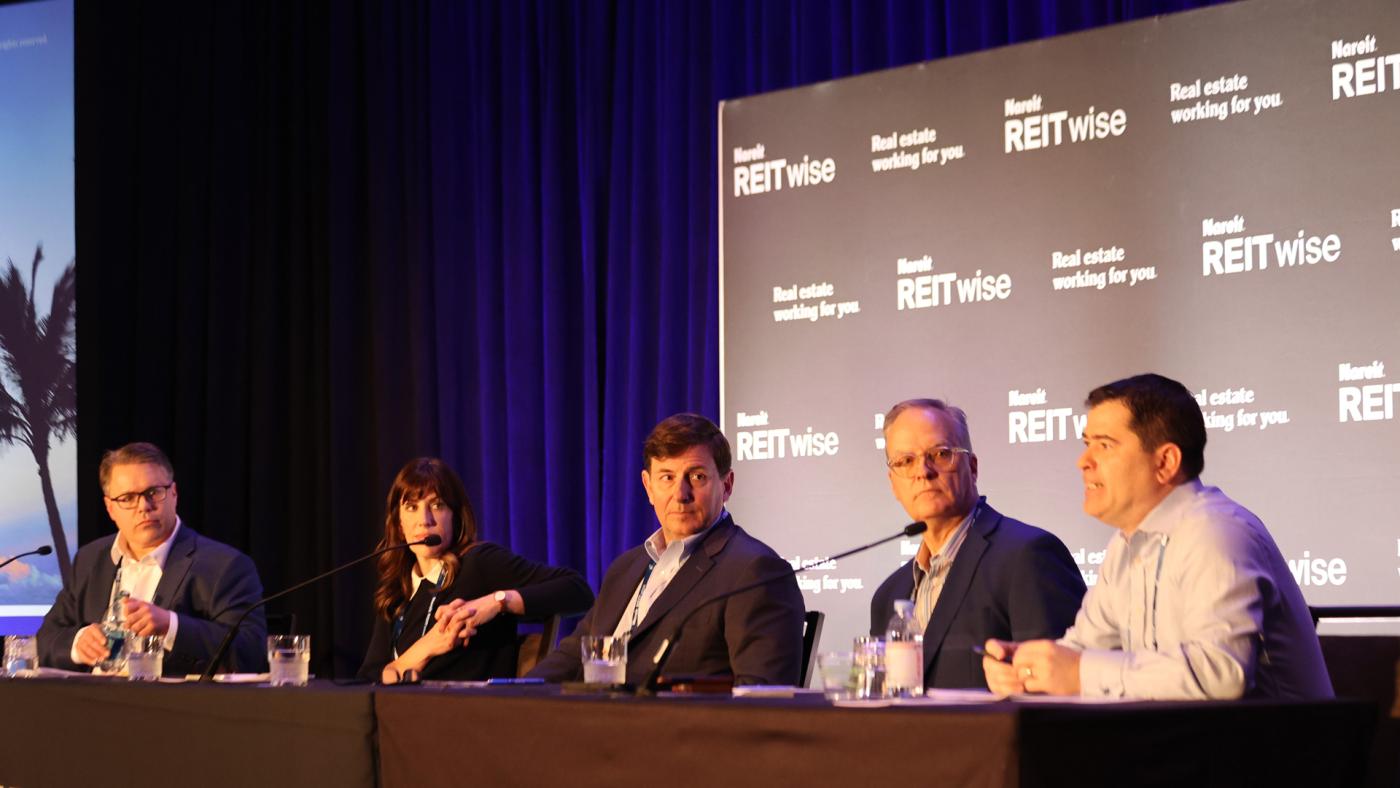
Preliminary insights into the SEC’s final rule on public company climate disclosure was the key topic of conversation during this session that focused on various proposals and rules on the SEC’s agenda. Panelists specifically discussed the aspects of the final climate rule and implementation framework that accounted for REITs’ perspectives and the status of lawsuits against the rule. In addition, the panelists talked about other SEC disclosure initiatives, including the modernization of insider trading requirements, the Commission’s pending human capital management proposal, and its overturned corporate stock buyback rule. Eric Kevorkian, senior vice president, chief legal officer, and secretary at BXP, moderated the session, which also featured: Rob Del Priore, executive vice president, chief accounting officer, and general counsel at MAA; Brian Hirshberg, partner at Mayer Brown; Kerry Johnson, partner and co-chair of the U.S. Real Estate Sector at DLA Piper LLP (U.S.); and Deborah Marson, executive vice president, general counsel, and secretary at Iron Mountain.